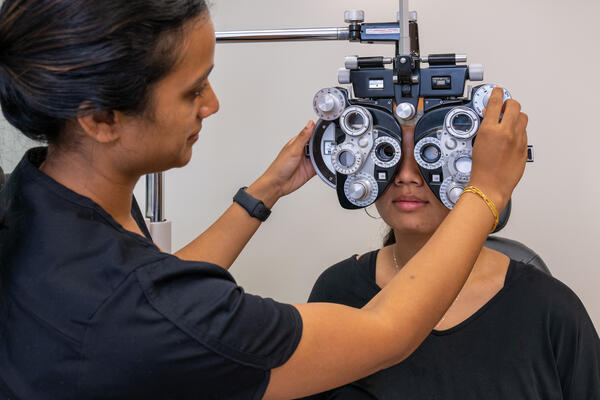Neurologist in Andalusia: Leading Specialists and Clinics Detailed
Neurologist in Andalusia: Leading Specialists and Clinics Detailed
Blog Article
Browsing the Puzzle of Refractive Surgeries: Which Procedure Is Right for You?
In the realm of refractive surgeries targeted at remedying vision, the selection of available procedures can commonly feel like a labyrinth, each guaranteeing to supply clarity and accuracy. As people consider embarking on the trip in the direction of more clear eyesight, the sixty-four-thousand-dollar question develops: which treatment is indeed the most suitable option? Browsing this complex puzzle entails understanding the nuances of various alternatives, thinking about individual aspects that play a crucial duty in decision-making, and critical the differences in between preferred vision correction methods. Nevertheless, in the middle of this complexity lies the promise of customized options that satisfy specific requirements, making the mission for the best refractive surgery a highly tailored and elaborate procedure. The look for the suitable procedure requires a cautious evaluation of several elements, eventually bring about the selection of a course that straightens perfectly with one's one-of-a-kind demands.
Comprehending Refractive Surgical Procedure Options

Variables to Think About Prior To Picking
Selecting the most suitable refractive surgical procedure needs a comprehensive analysis of different factors to make certain optimal end results for each person. Before picking a procedure, several essential factors to consider must be taken into account.
Furthermore, lifestyle aspects ought to not be forgotten. Individuals with energetic way of lives or certain work-related demands might benefit a lot more from certain treatments. As an example, people associated with contact sports might decide for procedures like PRK over LASIK because of the minimized danger of flap difficulties. Financial considerations, consisting of the price of surgical procedure, prospective insurance policy protection, and post-operative treatment expenditures, should likewise be factored right into the decision-making procedure. By thoroughly considering these consider appointment with a trusted eye treatment company, people can make educated decisions concerning the most appropriate refractive surgical treatment choice for their unique needs.
Contrasting Popular Vision Correction Treatments
Taking into consideration the different elements that influence the selection of a refractive surgical procedure, it is critical to contrast prominent vision adjustment procedures to figure out pop over to these guys the most ideal choice for individual demands. Two extensively well-known treatments are LASIK (Laser-Assisted in Situ Keratomileusis) and PRK (Photorefractive Keratectomy)
LASIK involves creating a slim flap on the cornea, reshaping the underlying tissue with a laser, and after that rearranging the flap. It provides quick healing and minimal pain, with the majority of individuals experiencing improved vision almost quickly. On the other hand, PRK involves getting rid of the outer layer of the cornea before improving it with a laser. The healing period is longer contrasted to LASIK, PRK is a better choice for people with thin corneas or specific corneal irregularities.
When comparing these procedures, variables like corneal thickness, eye health and wellness, and wanted recuperation time need to be very carefully taken into consideration. Consulting with an experienced ophthalmologist is necessary to identify one of the most ideal treatment based on an individual's particular requirements and eye wellness standing.
Customized Treatments for Individual Requirements
Tailoring refractive surgeries to meet unique patient needs is essential in attaining optimum aesthetic results and fulfillment rates. Customized treatments think about individual factors such straight from the source as prescription strength, corneal density, student size, and lifestyle considerations to establish one of the most appropriate procedure for each person. Advanced modern technologies like wavefront-optimized or wavefront-guided therapies enable surgeons to address higher-order aberrations and enhance aesthetic high quality beyond what traditional procedures can offer.

Finding the Right Doctor for You
When seeking a cosmetic surgeon for refractive surgical procedure, it is vital to prioritize proficiency and experience in the area. The cosmetic surgeon you pick will play a substantial function in the success of your treatment and the outcome of your vision. To discover the right doctor for you, consider aspects such as their qualifications, expertise in refractive surgeries, and the variety of procedures they have actually executed.
Begin by looking into possible cosmetic surgeons and their qualifications. Look for eye doctors that are board-certified and have particular training in refractive surgical procedure. Additionally, review person reviews and before-and-after photos to determine the surgeon's track document of successful end results.
During examinations, ask concerning the cosmetic surgeon's experience with the certain treatment you are considering. Inquire about their issue prices, success prices, and just how they deal with any type of possible threats connected with the surgical treatment. A experienced and experienced specialist will certainly navigate to this site not only have the technical experience but also the capability to tailor the therapy to your individual demands, making sure the most effective possible results for your vision modification trip.
Conclusion
In conclusion, when considering refractive surgical procedures, it is crucial to recognize the offered options, variables to think about, and the differences between preferred treatments. Finding a proficient surgeon that can direct you via the puzzle of choices is extremely important in making sure a successful vision improvement procedure.
In the world of refractive surgical procedures intended at correcting vision, the variety of available procedures can typically appear like a labyrinth, each guaranteeing to provide quality and precision. One typical treatment is LASIK (Laser-Assisted in Situ Keratomileusis), where a laser reshapes the cornea to deal with refractive errors such as farsightedness, nearsightedness, and astigmatism. Custom-made treatments take into account private variables such as prescription strength, corneal thickness, student dimension, and lifestyle considerations to identify the most ideal treatment for each patient. To discover the ideal doctor for you, take into consideration factors such as their qualifications, expertise in refractive surgical treatments, and the number of treatments they have actually performed.
In conclusion, when thinking about refractive surgical procedures, it is important to understand the readily available alternatives, aspects to take into consideration, and the distinctions between prominent procedures. - eye center andalusia
Report this page